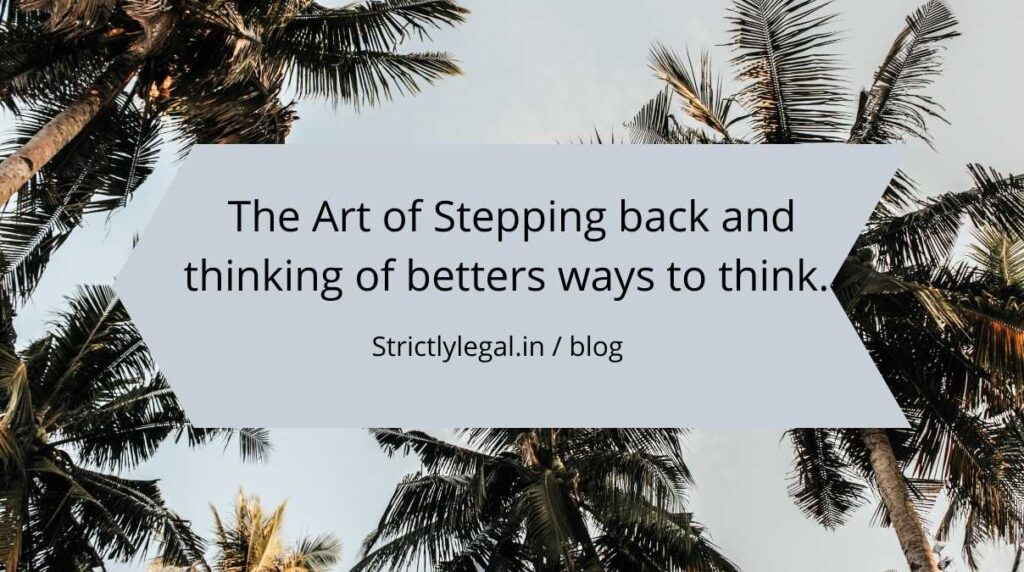In this article, we will briefly discuss certain topics in philosophy such as to start with: the meaning of philosophy, why its important. Some fundamentals of philosophy such as what it is to obey the law, and lastly about minds, morals, and judgments.
Table of Contents
How is philosophy related to law?
To answer this question you will have to understand the meaning of philosophy and why one should read philosophy.
What is Philosophy?
It is a subject as I know it that concentrates on THINKING. The definition of this subject just like any other social science is difficult to explain in a matter of few words. Just like people even today struggle to answer simple questions like What is law?
But the question arises, Isn’t every subject related to thinking on the domain they are concerned about?
Chemistry thinks about chemicals and reactions. Physics about physical world and attraction of things maybe and other social sciences like law thinks how it as a subject can bring about responsibility and liability in the society.
How is philosophy any different?
Let’s look at it in this way… Philosophy isn’t just about THINKING but about thinking the right ways of thinking. In other words, It is widely known to be an art of stepping back and thinking the right way of thinking.
For example, Physics as a subject deals with the analysis of the environment, performing experiments, and conforming or refuting ideas based on the experiments. Physics thinks about physics.
On the other hand, when you step back from physics and start asking questions such as what it is really that we’re dealing with, what it means for an experiment to conform to or refute an idea…That’s when you move from doing physics to doing the philosophy of physics.
Therefore, As we all know, Law as a subject is not independent. It draws fragments from various other subjects and that includes philosophy too. It is important for the lawmakers and the participants of the law to understand why people do what they do and what it is that they do.
It’s a really complicated pitch but as you read along this blog post, you’ll understand the thing I am trying to illustrate.
Morality: Objective, Emotive or Relative?
As I said previously, It is important to understand why people do things the way they do it and what it is that they’re thinking when they do it.
Morality is a big part of our thinking.
Less than a year ago, I didn’t know what morality meant, I just had heard about moral science, the subject that is compulsory but gets ignored in almost all schools across India.
As I starting exploring the subjects of law lately, I can say morality is a small but powerful word, Its a big influence on our reasons to do things.
So, we’re asking a question now, Why are people doing the things that they’re doing and what is it that they’re thinking when they’re doing a particular thing? In this, we’re essentially questioning the Status of Morality.
There are three basic approaches in which philosophers have had their take on the Status of Morality. These three approaches broadly demonstrate why people think the way they think.
Objectivism
For example, I think that the earth has gravity because of the reasons of objectivity. It is something that has been established by human sciences and its truth is made true not by who I am or my culture, but about, by something independent of me, independent of who I am.
This the reason why I think that the earth has gravity.
Relativism
For example, I think that Polygamy is bad because of the reasons of relativism.
So the basic idea behind relativism is that our moral judgments are indeed the sorts of things that can be true or false, but they’re only true or false relative to something that varies from person to person or culture to culture.
Dave Ward
In simpler terms, I think polygamy is bad because of my background, of the way in which I was brought up. The society in which I grew has had a great influence in my thinking that polygamy is bad.
This is relative because the decision is related to me. In the same way, If I were a person living at the time when polygamy being morally bad wasn’t a thing then my moral subconscious wouldn’t say Polygamy is bad.
So basically, there are certain things that cannot be true or false. It can be true for someone but still be false for another.
Subjectivism
The subjectivist idea that is the basic idea behind subjectivism says that our moral judgments are true or false, but they’re only true or false relative to the subjective feelings of a certain person, the person who makes them. So, it’s almost like when I say X is bad, I’m saying I morally disapprove of X.
There’s a nice feature to subjectivism that it can explain the way our moral judgments are intimately tied up with how we are motivated to act. So if I dislike something I’ll be motivated to avoid it or to not promote it. Or if I like something or approve of something I’ll be motivated to, promote it or drawn towards it. so the subjectivist has that nice explanation of the connection between morality and our motivations.
That’s how David Ward of the School of philosophy, psychology and language sciences at the university of Edinburgh likes to explain it.
Emotivism
So the basic idea in emotivisim is that our moral judgments are not the type of things that can be true or false, neither objectively true or false, nor true or false relative to some person’s feelings or for that matter some culture. They are the direct expression of our emotions to the world.
For example when I say, Polygamy is bad, I merely express my feeling that Polygamy is bad. Its like “Eww Polygamy?”
Well, this is just the face of it. Of course, these are fundamentally a lot different when you read and understand the whole of it.
Philosophy also tries to find answers like…
Why should we obey the law?
Your answers will be similar to reasons like because the state forces it on us or enforces punishments if we don’t.
We have to first understand that Obeying the law is fundamentally not the same as Complying with the law. When we are paying our taxes when the government wants us to pay and on failure to do so imposes fine… that’s when we are complying with the law and not obeying the law.
We comply with the law because the law commands us to do so. This is not the case when we obey the law.
For example, suppose you’re riding a bike on a empty street and you know there’s no one around so you can easily break the speed barrier and over speed to enjoy that thrill of your ride. There’s no one to stop you, no traffic police and no fine. But you chose not to over speed. That’s when you are obeying the law and not complying with the law.
Complying with the law comes with several obligations such as if you don’t comply, you’ll be liable for action. But its unclear if obeying the law comes with obligations.
The later part of this blogs tries to see through the reasons why there might be an obligation to obey the law.
Benefit theory
Socrates, the Greek philosopher suggested that we have an obligation to obey the law because the state confers certain benefits to us. And therefore we’re obliged to obey the state because of the great benefits of the state has bestowed upon us. By being benefited by the state, citizens acquire the obligation to obey the law out of gratitude
But here comes a question: Does being benefited have an obligation to obey?
Let’s look at this example: I invite you to dinner at a restaurant and I pay the bill. You are being benefited by me. Thereafter, will you do anything that I say? Do you have an obligation to obey me?
Certainly, people can do things for food but it’s not the case here. At most, you have an obligation to thank me for the food out of gratitude and nothing more.
Therefore, Its not the kind of reason we’re looking to obey the state.
Consent theory
This theory is closely related to philosophers like Thomas Hobbes and John Locke. It basically says that by consenting to the state we have an obligation to obey the state.
This theory tries to reason that we have an obligation to obey the state because we’ve consented to the state and to having such obligations to it.
This pretty much explains itself, When you have consented to something like being employed as my servant, you certainly have an obligation to obey me.
But one of the core characteristics that makes consent so powerful is the ability to withdraw the same. How is taking consent even useful if you don’t have the power to withdraw it?
I cannot write a letter to the Government of India refusing to obey the laws because I do not consent to it. That’s how fragile the consent theory is in this matter.
Fairness or co-operative scheme
This theory states that citizens are a part of a cooperative scheme that are mutually beneficial and fair. For example, When I was in a staying in an apartment with my friends for college we made up this cooperative scheme where each of my friends had certain responsibility for the day. Someone had to do the dishes while the other had to cook and so on.
Agreeing to such a scheme each of my friends had enter into an obligation to obey.
But the reason why this does not apply to a situation like obeying the state is that we, the citizens of the state have not voluntarily enrolled ourselves to such cooperative schemes. It has been forced upon us on our birth and we’re limited to leaving it because of various reasons like cost and other inability.
So, the conclusion isn’t very clear from the philosophical point of view. Each of these reasons had various pros and cons but none that can stand out as a clear reason to obey the state.
Remember, when we’re asking questions in philosophy we’re trying to fundamentally adapt ourselves to the reasons for that thing. We do seek answers but most of the time we’re left with more questions instead and such is the nature of this subject.
Disclaimer: This is not a sponsored post.
This blog post was possible because of the awesome instructors at School of Philosophy, psychology and language sciences at the University of Edinburgh who helped me study these very interesting questions through a coursera online course.

I’d suggest you take the course, also you get a certificate free of cost if you enroll before the 31st July 2020. Even after the date, auditing of the course will still be free.

Passionate about using the law to make a difference in people’s lives. An Advocate by profession.




